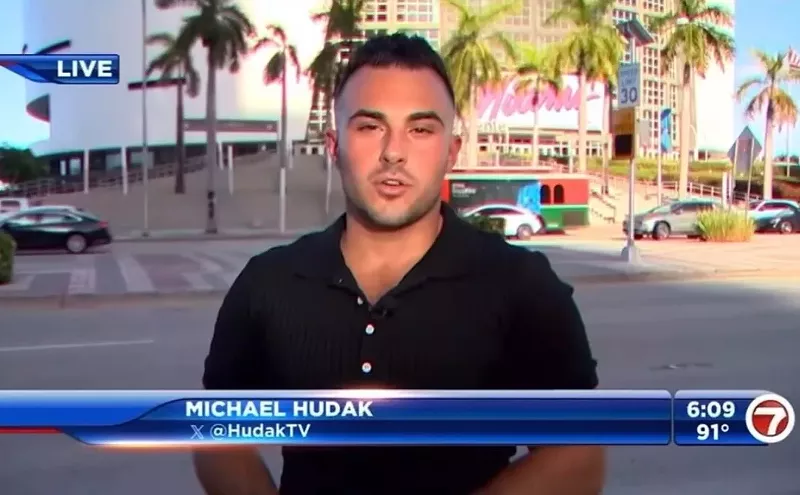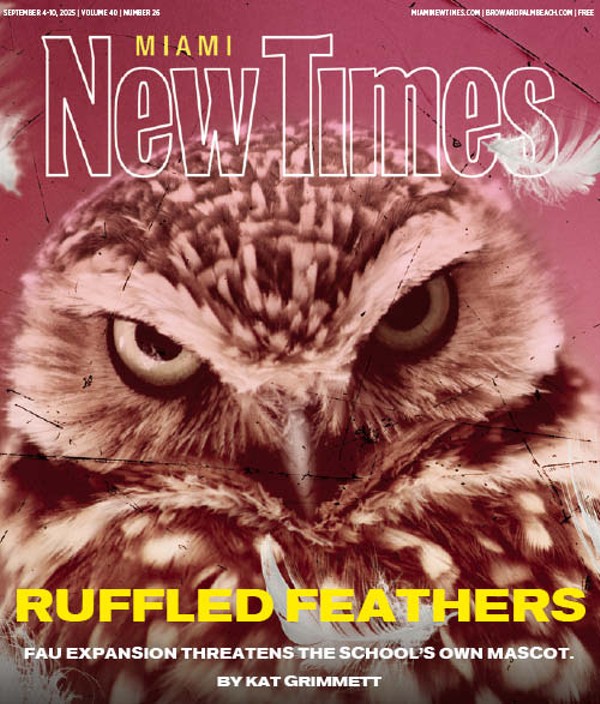At recent fundraising events Cancela has certainly proven himself to be the most inspiring candidate in the August 2004 election to succeed Penelas, articulating a liberalism that's both tough-minded and visionary -- inextricably linking economic development with social justice. And we're not just saying that because he's grafted entire chunks of Kulchur's profile of him into his stump speech.
Okay, that's exactly why we're saying it.
But regardless of Cancela's true identity, his liberal credentials are set to receive an impressive buffing -- at least inadvertently. Cancela, by selling off the now-bankrupt Radio Unica's fifteen radio stations, may be responsible for ushering into existence the much-ballyhooed liberal talk-radio network set to begin broadcasting this March.
Since the newly formed Progress Media first declared its intention to launch a left-leaning rejoinder to Rush Limbaugh, announcing its ongoing negotiations with hosts Al Franken, fellow comedian Janeane Garofalo, and media critic Michael Wolff, speculation has centered on just which stations would pick up this nascent network. After all, as Franken -- author of the anti-Fox News Channel polemic Lies and the Lying Liars Who Tell Them -- quipped to the Dallas Morning News: "The problem is that the radio talk-show landscape is owned by right-wingers. And if you're a liberal, you can't go on after Rush Limbaugh. It's like putting on classic rock after country music. Radio is about format .... With this network we'd have fourteen-hour days with progressive programming and talk." And don't suggest that such a network already exists. "It can't be NPR," Franken countered, "so there will be no features on Appalachian quilts."
Progress Media's president, Jon Sinton, has picked up on that thread, saying in one interview that he had no intention of approaching established talk-radio outlets to carry his lineup. Instead he'd be "targeting underperforming stations in any market."
Enter MultiCultural Radio Broadcasting, which recently purchased Radio Unica's 15 stations for $150 million, bringing its national total to 49: a coast-to-coast string of low-profile, brokered-time outlets, including six separate stations in Los Angeles and four in New York City. Clearly MultiCultural has more than enough bandwidth to go around.
Arthur Liu, president and CEO of MultiCultural, told the New York Post this past August that he was in talks with Progress Media's owners to run their fledgling shows on one of his New York stations ("No deals yet, but we hope so") and presumably on several of his other stations around the country.
Following his October bankruptcy purchase of Radio Unica, however, Liu has been silent. And Progress Media, while announcing its own purchase of five as-yet unnamed stations in New York, Los Angeles, San Francisco, Philadelphia, and Boston, has also refused to provide further details on its syndication plans. So is the freshly expanded MultiCultural chain set to host Progress Media's liberal talkers? Will Al Franken's Bush-bashing compete for radio listeners with Rush Limbaugh's hectoring of Hillary Clinton and her legion of so-called, ahem, "feminazis"?
José Cancela dropped a hint, telling Kulchur that Progress Media's backers had made inquiries to him into buying Radio Unica's stations prior to their sale to MultiCultural. Now, though, he was out of the informational loop.
Inside MultiCultural's Manhattan offices, the company's chief financial officer, Sean Kim, played it coy. At times he intimated that negotiations with Progress Media were under way. At other points in a conversation with Kulchur he claimed to be absolutely unaware of such matters -- despite being MultiCultural's CFO -- and deferred questions to Arthur Liu, who did not return phone calls.
Kim's only immediate plans for Miami's WNMA-AM (1210) were that, come January 2004, like Radio Unica's stations in Dallas, Houston, Phoenix, San Antonio, and Tucson, it would be turned into Spanish-language, brokered programming. Engineers and technical staffers may have a chance to keep their jobs, but the current on-air talent would be entirely eliminated. In their place would be anyone looking to rent airtime. These new on-air hosts are then free to spin any records they wish, jabber about any topic they desire, and to profit from as many commercials as they're able to hawk. Far from being a Latin Tower of Babel, Kim argued, such an approach was democracy at its finest.
"We understand that all Spanish people are not created equal," Kim continued, taking pains to emphasize that while MultiCultural's stations were usually labeled as Asian community-oriented, 43 percent of its current programming was in Spanish. "Your Cubans have different interests than your Mexicans, your Puerto Ricans, and your Ecuadorians. We're trying to create an outlet for Cubans if they want to talk about béisbol, for Mexicans if they want to talk about fútbol, or for Ecuadorians if they want to talk about cumbia music. We're a for-profit company, but our company's philosophy is to provide a medium for people who want to voice out and express their identity. That's what multiculturalism is about: allowing minorities within minorities to have their own shows." Kim was gathering steam now. "We're like the good ol' America of the Eighteenth Century: Give us your hungry and tired!"
That pitch sounds an awful lot like the credo for a liberal talk radio network. Once and for all, are you in talks with Progress Media to carry their liberal talk shows?
"It hasn't materialized yet," Kim answered cryptically.
So something could materialize?
"It could be at the very preliminary stage. I'm not sure if it's materialized any more since the initial discussion stage."
I have no idea what that means. Can't you just level with me?
"What I'm trying to tell you is -- not much." Kim began laughing, bemused at the dance going on: "I'm just trying to be as discreet as possible. We can't comment on any specific economics of the transaction."
The transaction? There's an actual transaction in motion? You're making my head hurt.
Kim, however, seemed to be enjoying Kulchur's speculation over Progress Media's next move: "Perhaps with all this press, they'll come back to the table."












